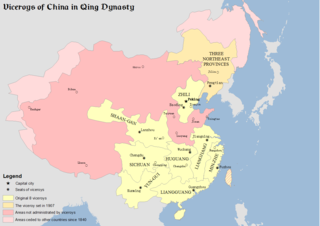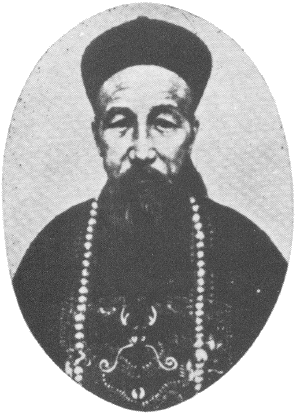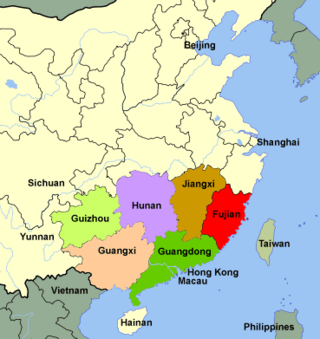
The Taiping Rebellion, also known as the Taiping Civil War or the Taiping Revolution, was a civil war in China between the Manchu-led Qing dynasty and the Hakka-led Taiping Heavenly Kingdom. The conflict lasted 14 years, from its outbreak in 1850 until the fall of Taiping-controlled Nanjing—which they had renamed Tianjing "heavenly capital"—in 1864. However, the last rebel forces were not defeated until August 1871. Estimates of the conflict's death toll range between 20 and 30 million people, representing 5–10% of China's population at that time. While the Qing ultimately defeated the rebellion, the victory came at a great cost to the state's economic and political viability.

Ningbo is a sub-provincial city in northeast Zhejiang province, People's Republic of China. It comprises six urban districts, two satellite county-level cities, and two rural counties, including several islands in Hangzhou Bay and the East China Sea. Ningbo is the southern economic center of the Yangtze Delta megalopolis. The port of Ningbo–Zhoushan, spread across several locations, is the world's busiest port by cargo tonnage and world's third-busiest container port since 2010.
The Battle of Cixi or Battle of Tzeki (慈溪之戰) was an armed engagement in the Taiping Rebellion fought between the Ever Victorious Army of the Qing dynasty and forces of the Taiping Heavenly Kingdom on September 21, 1862, at Cixi. The battle, which was won by the Ever Victorious Army, resulted in the mortal wounding of Frederick Townsend Ward, the American mercenary who founded and commanded the force. Ward's death after the battle led to the succession of Henry Andres Burgevine as commander of the Ever Victorious Army and initiated a period of decline for the force.

Zongdu were high-level officials responsible for overseeing the governors of several provinces in Ming and Qing China. One viceroy usually administered several provinces and was in charge of all affairs of military, food, wages, rivers, and provincial governors within their region of jurisdiction. Viceroys were appointed by and directly reported to the Emperor.
Hong Rengan was an important leader of the Taiping Rebellion. He was a distant cousin of the movement's founder and spiritual leader Hong Xiuquan. His position as the Gan Wang resembled the role of a prime minister. He is a noted figure in history because of the sweeping reforms attempted under his rule, and because of his popularity in the West.
Small Swords Society or Small Sword Society was a political and military organisation active in Shanghai, China, and neighbouring areas amid the Taiping Rebellion, between about 1840 and 1855. Members of the society, rebelling against the Qing dynasty, occupied old Shanghai and many of the surrounding villages. Chinese gentry and merchants took refuge in the British and French concessions, which were regarded as the only safe places. The rebellion was suppressed and the society expelled from Shanghai in February 1855.

The Xiang Army or Hunan Army was a standing army organized by Zeng Guofan from existing regional and village militia forces called tuanlian to contain the Taiping Rebellion in Qing China. The name is taken from the Hunan region where the Army was raised. The Army was financed through local nobles and gentry, as opposed to through the centralized Manchu-led Qing dynasty. The army was mostly disbanded by Zeng after the re-capture of the Taiping capital at Nanking.
Jiangnan Daying or the Jiangnan Battalion; was an army group assembled by the Qing dynasty. The army group consist of mostly Green Standard Army, and their goal was to quell the Taiping Rebellion around the Jiangnan region. The army group twice encircled Nanjing, the capital of the Taiping Heavenly Kingdom, but were defeated by the Taiping forces on both occasions.
The Battle of Jiangnan (1860), also known as the Second rout of the Jiangnan Battalion took place between the Qing government's Green Standard Army and the army of the Taiping Heavenly Kingdom during the Taiping Rebellion. The Green Standard Army twice attempted to besiege Nanjing, capital of the Taiping Heavenly Kingdom, but was unable to break through. To break the siege of Nanjing, the Taiping forces maneuvered to divert Qing forces by sacking Hangzhou, before quickly moving back to Nanjing to counter-encircle the Qing siege forces and routing the Green Standard Army garrison completely, breaking the siege of Nanjing.
The Battle of Shanghai (太平軍二攻上海) was a major engagement of the Taiping Rebellion that occurred from June 1861 to July 1862. British and French troops used modern artillery on a large scale for the first time in China. Cannon fire inflicted heavy casualties on the Taiping forces, whose commander Li Xiucheng was wounded in the left leg by a shot fired from a cannon.

The Taiping Heavenly Kingdom, or the Heavenly Kingdom of Great Peace (1851–1864), was a theocratic monarchy which sought to overthrow the Qing dynasty. The Heavenly Kingdom, or Heavenly Dynasty, was led by Hong Xiuquan. Its capital was at Tianjing, present-day Nanjing. The unsuccessful war it waged against the Qing is known as the Taiping Rebellion.

The Red Turban Rebellion of 1854–1856 was a rebellion by members of the Tiandihui in the Guangdong province of South China.

The Battle of Anqing (安慶之戰) was a prolonged siege of the prefecture-level city of Anqing in Anhui, China, initiated by Hunan Army forces loyal to the Qing Dynasty against the armies of the Taiping Heavenly Kingdom. The siege began in September 1860 and ended on September 5, 1861, when imperial forces under the command of Zeng Guoquan breached the walls of the city and occupied it.
Pirates of the South China Coast were Chinese pirates who were active in the north-western coasts of the South China Sea from the late 18th century to the 19th century, mainly during a 20-year period from 1790 to 1810. After 1805, the pirates of the South China Coast entered their most powerful period. Many pirates were fully trained by the Tây Sơn dynasty of Vietnam.
Events from the year 1860 in China.
Chinese tokens were an alternative currency in the form of token coins produced in China during the late Qing dynasty around the time of the Taiping Rebellion in the province of Jiangsu but not by the Taiping government, which had issued its own currency. Later tokens were again issued in Jiangsu during the Japanese occupation. These tokens were typically made by merchants and local businesses as well as local authorities and had nominal values denominated in their value in cash coins.
The Eastern Expedition encompassed the Taiping Heavenly Kingdom's efforts to capture the Yangtze River Delta, the provinces of Jiangsu, Anhui, and Zhejiang. Most of the areas would eventually be occupied by the Taipings, but they were notably repulsed at several locations, especially the city of Shanghai. Following the Jintian uprising in the southern province Guangxi and the beginning of open hostilities, Taiping forces attacked and captured Nanjing in central China by 1853. The Western Expedition captured cities along the Yangtze River like Zhenjiang, Anqing were captured later the same year.

Haichao Temple is a Buddhist temple located in Shangcheng District of Hangzhou, Zhejiang. Alongside Lingyin Temple, Jing Temple and Zhaoqing Temple, it was one of the Four Buddhist Temples in Hangzhou.
HMS Ringdove was a Vigilant-class gunvessel of the Royal Navy. She was launched by J. Samuel White, Cowes in 1856 and broken up in Cowes in 1866.
HMS Kestrel was a Clown-class gunboat of the Royal Navy. She was launched in 1856, serving in China and Japan in the 1850s and 1860s. She saw action during the Second Opium War and the Taiping Rebellion.






